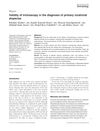 37 citations,
September 2018 in “Psychoneuroendocrinology”
37 citations,
September 2018 in “Psychoneuroendocrinology” Finasteride treatment in male rats causes long-lasting effects on depression-like behavior, brain cell growth, inflammation, and gut bacteria composition.
 12 citations,
September 2018 in “Journal of Drug Delivery Science and Technology”
12 citations,
September 2018 in “Journal of Drug Delivery Science and Technology” The silk fibroin hydrogel with FGF-2-liposome can potentially treat hair loss in mice.
 12 citations,
May 2019 in “The journal of pharmacology and experimental therapeutics/The Journal of pharmacology and experimental therapeutics”
12 citations,
May 2019 in “The journal of pharmacology and experimental therapeutics/The Journal of pharmacology and experimental therapeutics” Activating TRPV3 channels stops hair growth by killing hair follicle cells.
 4 citations,
June 2022 in “Clinical, cosmetic and investigational dermatology”
4 citations,
June 2022 in “Clinical, cosmetic and investigational dermatology” The new SFS Scale predicts hair transplant difficulty using hair and skin types, with thick skin and coily hair being hardest to work with.
 31 citations,
May 2019 in “Nature communications”
31 citations,
May 2019 in “Nature communications” Single Blimp1+ cells can create functional sebaceous gland organoids in the lab.
 47 citations,
November 2012 in “Pharmaceutical research”
47 citations,
November 2012 in “Pharmaceutical research” Surface-modified nanoparticles mainly use non-follicular pathways to enhance skin permeation of ibuprofen and could improve treatment for inflammatory skin diseases.
 5 citations,
March 2019 in “Journal of lipid research”
5 citations,
March 2019 in “Journal of lipid research” New probes were created to effectively measure specific enzymes involved in fat metabolism, which could help develop new drugs.
 January 2024 in “Frontiers in endocrinology”
January 2024 in “Frontiers in endocrinology” The study suggests that hypothyroidism may cause alopecia areata.
 4 citations,
March 2021 in “Asian Journal of Beauty and Cosmetology”
4 citations,
March 2021 in “Asian Journal of Beauty and Cosmetology” Dendropanax, sea salt, and other extracts can help reduce hair loss and promote hair growth.
 May 2024 in “Scientific Reports”
May 2024 in “Scientific Reports” Androgen receptors in the mouse brain may explain cognitive and mood changes in prostate cancer treatment.
 March 2024 in “Journal of Microbiology and Biotechnology”
March 2024 in “Journal of Microbiology and Biotechnology” Phloroglucinol may help improve hair loss by promoting hair growth and reducing oxidative stress.
 45 citations,
May 2018 in “Stem Cell Research & Therapy”
45 citations,
May 2018 in “Stem Cell Research & Therapy” Using patients' own fat-derived cells to treat alopecia areata significantly improved hair growth and was safe.
 1 citations,
August 2023 in “Advanced Drug Delivery Reviews”
1 citations,
August 2023 in “Advanced Drug Delivery Reviews” Microneedles are promising for long-acting drug delivery and can improve patient compliance, but more data is needed to confirm their effectiveness.
 1 citations,
August 2023 in “Irish Journal of Medical Science (1971 -)”
1 citations,
August 2023 in “Irish Journal of Medical Science (1971 -)” About a quarter of the participants experienced hair loss after COVID-19 vaccination.

Activin A and follistatin control when ear hair cells form in mice.

Activin A promotes ear hair cell development, while follistatin delays it.
 January 2024 in “Biological Research”
January 2024 in “Biological Research” Tiny particles from stem cells can help protect ear cells from antibiotic damage by helping cells remove damaged parts.
 1 citations,
January 2024 in “Scientific reports (Nature Publishing Group)”
1 citations,
January 2024 in “Scientific reports (Nature Publishing Group)” Human hair was used to make biodegradable plastic films that could be useful for packaging and disposable products.
 9 citations,
November 2012 in “Biomolecules & therapeutics”
9 citations,
November 2012 in “Biomolecules & therapeutics” A compound from brown algae boosts the production of a certain inflammatory substance in skin cells.
 January 2024 in “Seven Editora eBooks”
January 2024 in “Seven Editora eBooks” Different techniques measure hair properties to ensure cosmetic products work.
 1 citations,
May 2022 in “Frontiers in medicine”
1 citations,
May 2022 in “Frontiers in medicine” Metformin helps improve skin regeneration by increasing the growth of skin stem cells.
 July 2020 in “bioRxiv (Cold Spring Harbor Laboratory)”
July 2020 in “bioRxiv (Cold Spring Harbor Laboratory)” The structure of SRD5A reveals how it reduces steroids, aiding drug design for related health conditions.
3 citations,
June 2018 in “Bioorganic & medicinal chemistry” Compounds 4, 4b, and 4c effectively inhibit an enzyme linked to testosterone conversion without significant toxicity.
15 citations,
October 2012 in “Journal of child neurology” The same genetic mutation in Sjögren-Larsson syndrome can lead to different levels of severity, suggesting other factors influence the symptoms.
 29 citations,
October 2016 in “Cell death and differentiation”
29 citations,
October 2016 in “Cell death and differentiation” ΔNp63α stops TAp73β from working in skin cancer by blocking its access to specific genes, not by directly interacting with it.
 February 2023 in “Scientific Reports”
February 2023 in “Scientific Reports” Cold Atmospheric Microwave Plasma (CAMP) helps hair cells grow and could potentially treat hair loss.
 34 citations,
April 2016 in “International Journal of Dermatology”
34 citations,
April 2016 in “International Journal of Dermatology” Trichoscopy is a useful method for identifying primary cicatricial alopecias and their specific types.
 3 citations,
July 2023 in “Nature Communications”
3 citations,
July 2023 in “Nature Communications” The ShorT method can detect and help reduce bias in medical AI by identifying shortcut learning.
 2 citations,
January 2016 in “Skin pharmacology and physiology”
2 citations,
January 2016 in “Skin pharmacology and physiology” Caragana korshinskii seed oil effectively treats fungal skin infections.
 3 citations,
May 2022 in “Oncogene”
3 citations,
May 2022 in “Oncogene” Vav2 and Vav3 proteins help control skin stem cell numbers and activity in both healthy and cancerous cells.



























